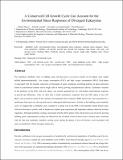A Conserved Cell Growth Cycle Can Account for the Environmental Stress Responses of Divergent Eukaryotes
Author(s)
Airoldi, Edoardo M.; van Oudenaarden, Alexander; Botstein, David; Slavov, Nikolai G
DownloadSlavov-2012-A Conserved Cell Gro.pdf (710.1Kb)
PUBLISHER_POLICY
Publisher Policy
Article is made available in accordance with the publisher's policy and may be subject to US copyright law. Please refer to the publisher's site for terms of use.
Terms of use
Metadata
Show full item recordAbstract
The respiratory metabolic cycle in budding yeast (Saccharomyces cerevisiae) consists of two phases most simply defined phenomenologically: low oxygen consumption (LOC) and high oxygen consumption (HOC). Each phase is associated with the periodic expression of thousands of genes, producing oscillating patterns of gene-expression found in synchronized cultures and in single cells of slowly growing unsynchronized cultures. Systematic variation in the durations of the HOC and LOC phases can account quantitatively for well-studied transcriptional responses to growth rate differences. Here we show that a similar mechanism, transitions from the HOC phase to the LOC phase, can account for much of the common environmental stress response (ESR) and for the cross protection by a preliminary heat stress (or slow growth rate) to subsequent lethal heat-stress. Similar to the budding yeast metabolic cycle, we suggest that a metabolic cycle, coupled in a similar way to the ESR, in the distantly related fission yeast, Schizosaccharomyces pombe, and in human can explain gene-expression and respiratory patterns observed in these organisms. Although metabolic cycling is associated with the G0/G1 phase of the cell division cycle of slowly growing budding yeast, transcriptional cycling was detected in the G2 phase of the division cycle in fission yeast, consistent with the idea that respiratory metabolic cycling occurs during the phases of the cell division cycle associated with mass accumulation in these divergent eukaryotes.
Date issued
2012-03Department
MIT Materials Research Laboratory; MIT Materials Research Laboratory; Massachusetts Institute of Technology. Department of BiologyJournal
Molecular Biology of the Cell
Publisher
American Society for Cell Biology
Citation
Slavov, N. et al. “A Conserved Cell Growth Cycle Can Account for the Environmental Stress Responses of Divergent Eukaryotes.” Molecular Biology of the Cell (2012): Web. 4 May 2012.
Version: Final published version
ISSN
1059-1524
1939-4586